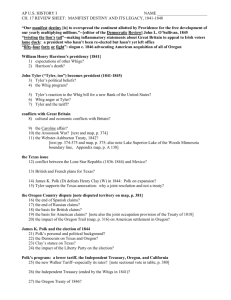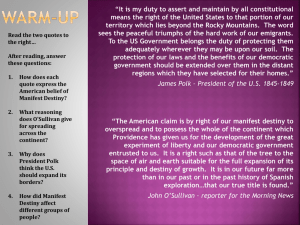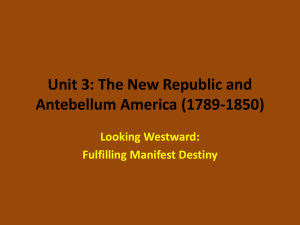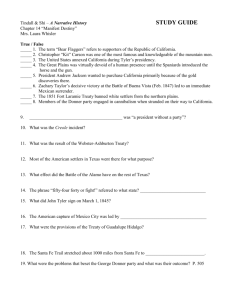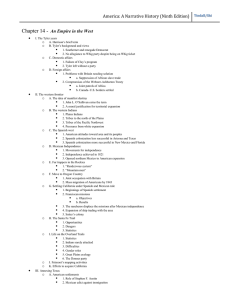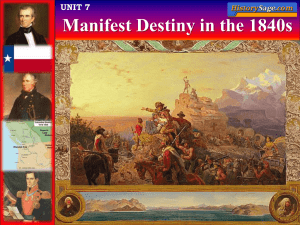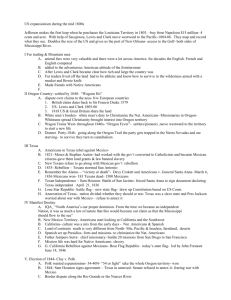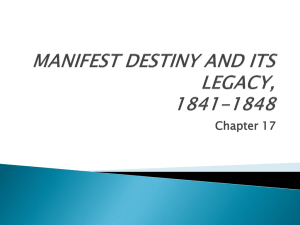Chapter 17
advertisement
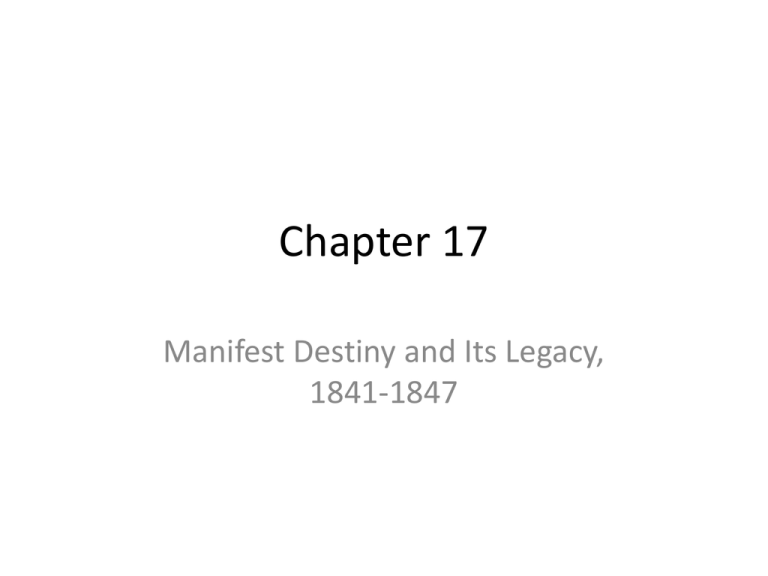
Chapter 17 Manifest Destiny and Its Legacy, 1841-1847 Key Things in Chapter 17 • Covers the Presidency’s of John Tyler and James K. Polk • Deals with the death of a President – transition of a successor • Troubles with England (1776, 1812, 1840’s) • Manifest Destiny and American expansion • Mexican War Tyler Becomes President • Election of 1840 – the Whigs finally win an election. Harrison is elected the 9th President of the United States. His Vice-President is a former Democrat who has recently joined the Whig Party – John Tyler of Virginia. Harrison gives the longest inaugural address in US history (2 hours long and edited by Daniel Webster)– catches pneumonia and dies 32 days after becoming President. • By law John Tyler becomes President and will have no Vice-President. Hated by the Democrats because he had become a Whig, and distrusted by the Whigs because he had “Democratic” tendencies.” Tyler Presidency continued • Tyler (the former Democrat) will openly fight with the Whig Party over the issue of a new national bank (The Fiscal Bank) – vetoed. And it is again passed under a separate name (The Fiscal Corporation) – also vetoed. • There is a small constitutional crisis over the fact that no President has ever died in office. The Constitution deals with the issue of succession, but other questions continue to persist and will not be answered until the adoption of the 25th Amendment in 1967. • No Vice-President is appointed to serve. (So what happens if Tyler dies or is removed from office?) This issue is resolved by the 25th Amendment and two Vice-Presidents have been appointed to finish terms (Gerald Ford, and Nelson Rockefeller) • Tyler gets no respect from either political side. He is often called “His Accidency” or referred to as “The Ex-Vice-President”. Trouble with England • Financial Issues: America had debt and continued to spend money on internal improvements (roadways, canals, etc) – England was overflowing with money (Industrialization) • US supports a small insurrection in Canada. Americans gave military supplies to the insurgents (never really grows) • The Caroline incident. British force attacks an American ship loaded with ammunition and supplies for the insurrection. It is attacked on the US side of the Niagara River (ship burned, sunk, and one American killed). The US has been attacked and invaded. – A couple of years later a man named McLeod is in a New York tavern and boasts that he was part of the raid. Americans arrest him and put him on trial for murder. England says they will go to war if he is executed. He is released after he proves he has an alibi. • The Creole incident. A group of 130 slaves escape and take over the ship the Creole and sailed to the British controlled island of the Bahamas. England (which has made slavery illegal) will give asylum to the Creole. • The Aroostock War. A boundary dispute between Maine and Canada – over the location of the border sees lumberjacks from both sides fighting over rich timber land. 12,000 square miles of land is in dispute. Resolved diplomatically by Lord Ashburton and Daniel Webster. America gets 7,000 square miles of the land in dispute. • Lone Star Republic of Texas. Texas has wanted to become part of the United States but has never been annexed (why?). Britain looks at this as an opportunity. – Opportunity to stop the spread of the United States – Opportunity to get prime cotton growing land – Opportunity to stop the spread of slavery • The Oregon Territory. Both the United States and England will dispute the border between Canada and Oregon (Oregon had originally been claimed by the Spanish, Russians, Americans, and British). US has stronger claim because most of the people living there are American. The Americans will argue that the boundary is the 54 40 parallel, and the British will argue that it is the 49th parallel. Manifest Destiny • Defined – that America was “destined” to control all of the land to the Pacific Ocean (some would argue even all of the North and South America). Usually the thought that God had destined that. • It was not official government policy but rather a popular belief. • Existed from the early 1840’s to mid-1850’s • Believed to come from a journalist named John O’Sullivan – who wrote an article about the annexation of Texas and talked about “divine destiny” Election of 1844 • Whigs nominate – Henry Clay • Democrats cannot settle on a candidate and after a number of ballots and seemingly deadlocked – they present a “dark-horse” – James K. Polk from Tennessee. • Former Speaker of the House of Representatives and Governor of Tennessee • The Democrats will adopt the concept of “Manifest Destiny” James K. Polk • Some consider to be America’s most successful President • Promises to serve one term (thinks it is to his advantage) • Makes a few key promises and he accomplishes all of them in his one term. Polk’s Campaign Promises • Lower the tariff. Secretary of Treasury Robert Walker will reduce it from 32% to 25% • Restores an independent treasury (and rejects the concept of a national bank). • Annexation of Texas • Acquisition of California • The Oregon Territory. “Fifty-four forty forever”. • Polk’s greatest desire is to acquire California. And will attempt on a couple of occasions to purchase California from Mexico (once sending John Slidell to offer $25 million for it). • Tension then begins to build over the location of the border of Texas (still an independent Lone Star Republic siding and supported by the United States). Mexico will claim the border as the Nueces River and Texas will claim the Rio Grande. • America will send General Zachary Taylor to the American border (Rio Grande) on January 13, 1846. • On April 25, 1846 Mexican troops will cross the Rio Grande and attack American troops – killing 16. • American blood had been spilled on American soil. Mexican War • As soon as war breaks out in Mexico – Polk will send a troop led by General Stephen Kearney to California. Before he can get there John C. Fremont will have “captured” the area and raised the flag for the Bear Flag Republic (an independent California). • America will develop a two-pronged attack to Mexico: General Zachary Taylor (“Old Rough and Ready”) attacking by land, and General Winfield Scott (“Old Fuss and Feathers”) will sail down east coast and attack Mexico City. • Zachary Taylor will have about 5,000 men and defeat a much larger force of 20,000 men led by Santa Anna. After heavy fighting at Buena Vista, Taylor forces the Mexican forces from the field and captures the city becoming the “Hero of Buena Vista”. He will also capture the city of Monterey. • Winfield Scott will sail down the east coast of Mexico landing at and laying siege (20 days) to Veracruz causing it to surrender. • In what is sometimes called one of the greatest military campaigns in US history, Scott will move his forces to capture Mexico City. Some of the heaviest fighting will take place at Chapultepec (similar to one of our military academies). Part of the Marine Corp hymn – “from the halls of Montezuma”. • Some of the people involved in this battle: Robert E. Lee, Ulysses Grant, Joseph E. Johnston, Pierre Beauregard, Thomas J. Jackson, and George Pickett. • Nicholas Trent is sent to travel with the Winfield Scott so that he can develop a peace treaty. Polk becomes “annoyed” with him and will want to recall him, but before he can be recalled he will get a deal done. • Treaty of Guadalupe Hildalgo – America will get Texas – America will get the land from Texas to Oregon (including California) – America will pay Mexico $15 million for land and an additional $3.25 million for individual claims Important Results from the Mexican War • America will get a territory larger than the Louisiana Purchase and will increase its size by 1/3. • Military experience will be gained – 14 years later these younger officers will become the leaders of the Civil War • The military waged a war without defeat or a major blunder • The American military gains respect with the rest of the world – maybe they are stronger than most people thought Wilmot Proviso • Proposed by Representative David Wilmot • Will propose that slavery cannot be in any of the territory gained during the Mexican War • Will twice pass the House of Representatives but will fail in the Senate
